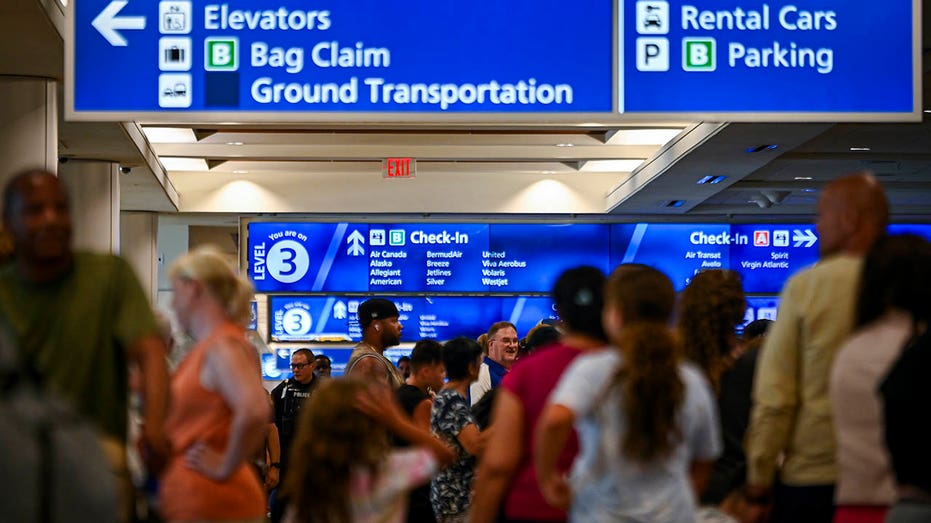Sen. Ted Cruz, R-Texas, A.I. cyber exploitation victim Elliston Berry and her mother Anna McAdams discuss the dangers of artificial intelligence as cyber exploitation schemes become a growing problem among minors.
A new report from Visa sheds light on emerging scams targeting consumers and travelers, which have included new twists on old tactics for defrauding victims.
Visa’s “State of Scams: Fall 2024 Biannual Threats Report” found that there has been a resurgence in physical theft in the last six months, with criminals buying gift cards or physical products using stolen payment info that can be resold, or using the card number for money transfers.
A new style of physical theft, known as “digital pickpocketing,” has also become increasingly common in the past year, according to the report. Scammers carry out the theft using a mobile point-of-sale device, which they tap against the wallet of an unsuspecting consumer to initiate a payment, often in crowded areas where the contact may be unnoticed.
Michael Jabbara, SVP and global head of fraud services at Visa, told FOX Business that, “Consumers should guard against digital pickpocketing by being aware of their surroundings. Much like old-school pickpockets, criminals prey on those who are distracted by what’s going on around them, which makes tourists in crowded areas a prime target.”
JOB SCAMS SURGED 118% IN 2023 DUE TO AI, WATCHDOG GROUP WARNS
Visa released a new report on emerging scams and threats to consumers. (Photo by Miguel J. Rodriguez Carrillo/Getty Images / Getty Images)
“People should also consider turning on real-time purchase alerts for their accounts. This way, should they become a victim of digital pickpocketing, they can immediately notify their bank, helping not only themselves but also others who could be a victim of the scammer,” Jabbara added.
| Ticker | Security | Last | Change | Change % |
|---|---|---|---|---|
| V | VISA INC. | 281.73 | -1.49 | -0.53% |
Scammers are also stepping up one-time-password phishing scams as a means of bypassing two-factor authentication protocols aimed at preventing unauthorized access to an account. Visa’s report noted that the scams have become more convincing in part due to the prevalence of generative artificial intelligence (AI) and its use to conduct reconnaissance on victims to include more convincing emails or other communications.
JOB OFFERS THROUGH TEXTS? BE CAREFUL, IT’S LIKELY A SCAM

Cybercriminals are using fake airline websites to scam travelers. (Photo by Annette Riedl/picture alliance via Getty Images / Getty Images)
Visa found that threat actors are also looking to capitalize on a busy travel season by exploiting consumers making travel plans. The report noted one common scam involves fraudulent websites that “spoof” or imitate those of major airlines and seek to entice consumers with cut-price deals, who make purchases and then are further lured by upcharges for in-flight services before the scammer cuts off the victim.
Scammers are also impersonating airline officials to send out fake cancellation emails that also request the individual’s payment information so that a new flight can be booked.
Jabbara said that aside from being aware of such scams, travelers should also “be cautious in crowded areas where distraction tactics are frequently used to steal belongings.”
SCAMMERS MOST COMMONLY IMPERSONATE THESE COMPANIES, FTC SAYS

Travelers should be on guard against the theft of their belongings as well as impersonation scams by fraudsters posing as airline officials online. (Miguel J. Rodriguez Carrillo/Getty Images / Getty Images)
He also offered some best practices that consumers should follow to protect themselves from fraud and scams, as well as how to respond to theft if it unfortunately occurs.
“First, consumers should set up purchase alerts to monitor their transactions and quickly flag if something is not right. Consumers should also set up two-factor authentication and protect any codes like they are passwords. Consumers should also keep themselves updated on the latest scams to help be aware of what fraudsters are capitalizing on,” Jabbara said.
Newsfromrss.com
“If consumers come upon something that is suspicious in their report, they should immediately contact their financial institution. After reporting the fraud, updating passwords and ensuring two-factor authentication is properly set up are crucial steps. If theft has occurred, it should also be reported to local law enforcement,” he added.


